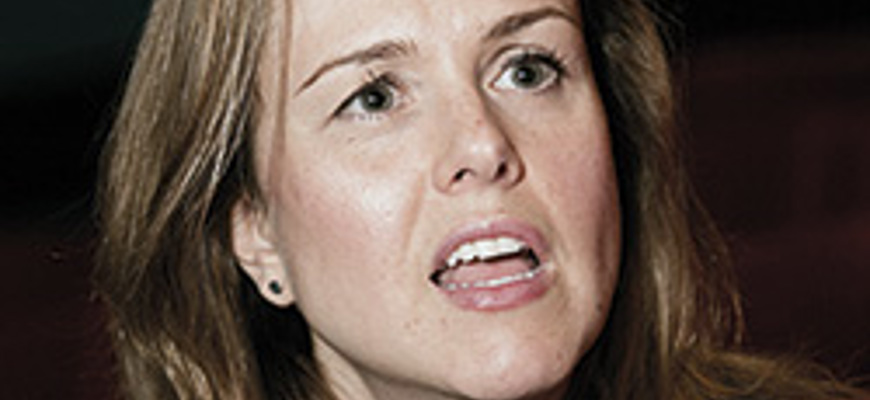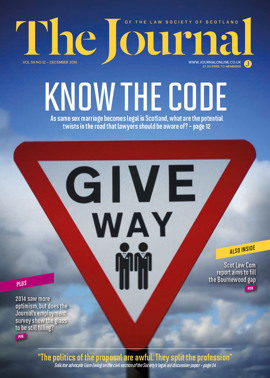Who's got what it takes?

Bias is an inbuilt human trait. Such was the opening message for those attending last month’s Update seminar, “Reducing Bias in Trainee Recruitment”. We tend to gravitate towards people we think we will have something in common with. And we may express bias in relation to others without even being aware that we are doing so. So we all have to work hard if we are to eliminate bias, and particularly unconscious bias, as we set about selecting those who will make up the next generation of our profession.
Readers may recall the presenter, Dr Suzanne Doyle-Morris, who we interviewed at Journal, November 2013, 10, when we discussed the results of the well-supported equalities survey that the Society had just conducted among the profession. In this seminar she began by having us team up and attempt an interactive digital exercise discussing an imaginary firm’s internship programme, in which the characters were of certain types familiar to many in the profession. Much of the rest of the morning for which the course was scheduled, was taken up with discussing themes that emerged.
Internship practices
To give them their due, the big firms who made up most of the attendees appear to be very conscious of their obligations to try and eliminate bias, and the need to devise systems that assist in doing so, even if their practices are not uniform. For example, most operate a “blind CV” system, which filters out details such as school or university attended that might trigger attitudes towards or against a particular candidate. While it was suggested that that will not work where unsolicited CVs have to be considered, there is apparently a free online resource that enables applications to be anonymised.
All operated internship or work experience programmes, which vary in length from two to six weeks. Those offering shorter periods were able to see and assess more people in that time (some of whom might have more than one such engagement set up over a summer), and maintained that two or three weeks provided a good idea of whether a candidate was of the right material. Longer internships were claimed to give the internees a better opportunity to get to know the firm – and the firm to know them.
Any length of internship was, however, agreed to be “better than a 45 minute interview”; and while obtaining such a place might be regarded by some intending trainees as a “golden ticket”, they are put under continued scrutiny from their first contact with the firm’s reception staff.
Some discussion took place about IT familiarity and whether those from better-off backgrounds remain more likely to feel comfortable with IT-based systems or exercises: there may still be some such effect, despite greater IT exposure in schools these days.
Bursary competitions were also raised – some have found them to attract relatively few entries, with those received often having been heavily coached.
For smaller firms?
What can smaller firms learn from the exercise? If interviews are relied on, some suggestions for good questions to ask were:
- Can you tell us about a tough situation you’ve been in, and how you handled it?
- How would your university peers describe you? (Probing beyond the initial answer, we were told, can be revealing and may show up attempted untruths here.)
- Can you tell us about an issue you feel strongly about? (This gives you a chance to assess how well they articulate, and whether they can hold the thread of an argument.)
- What people have influenced you?
- If they express an interest in a particular legal area, ask them if they can tell you about an interesting recent development in that area.
- And one that may wrongfoot them – if you were an animal, what would you be?
Whether to give more weight to work experience or extracurricular activities also came up – the suggestion being made that both may have value, and can be explored to find out a candidate’s life experience, how they handle situations and so on – “Give examples of things you’ve done”.
Observing candidates in group or social settings also provoked some interesting comments. Here you have to be mindful that not everyone, for example, wishes to take alcohol, as well as of the risks of “cultural capital” – tending towards someone because you discover a shared interest, or familiarity with a particular place.
A lot to take in, but to conclude with a positive suggestion from Doyle-Morris, “Curiosity and openmindedness are antidotes to unconscious bias.”
Dr Suzanne Doyle-Morris is founder of the InclusIQ Institute.
For more information on InclusIQ’s digital workplace games, visit www.inclusiq.com
In this issue
- Factors in the balance
- Balancing the right to decide
- Life yet in oil and gas
- Commercial awareness begins at trainee stage
- Relocation and the finances of contact
- Reading for pleasure
- Opinion: Archie Maciver
- Book reviews
- Profile
- President's column
- Up and running at last
- People on the move
- With this Act, I thee wed
- Tax: a mission to inform
- For better, for worse
- Filling the Bournewood gap
- Power talking
- For whose aid?
- Balanced view
- A laughing matter?
- Directors: how much is too much, or not enough?
- Credit where it's due?
- New age, new image, new media, continuing problems?
- Scottish Solicitors Discipline Tribunal
- Lawyers as leaders
- Property Law Committee update
- Property Standardisation Group update
- Over the finishing line – 2
- Not proven no more?
- Vulnerable clients guidance now extended to the young
- From the Brussels office
- Take it to the schools
- A future – a vision
- Ask Ash
- A strategy with legs?
- Who's got what it takes?
- I can act, but should I?
- Prominence unplanned






